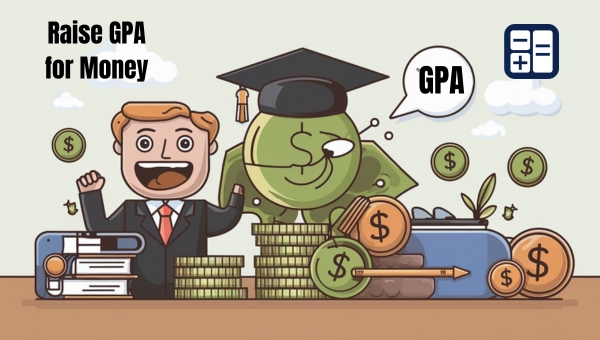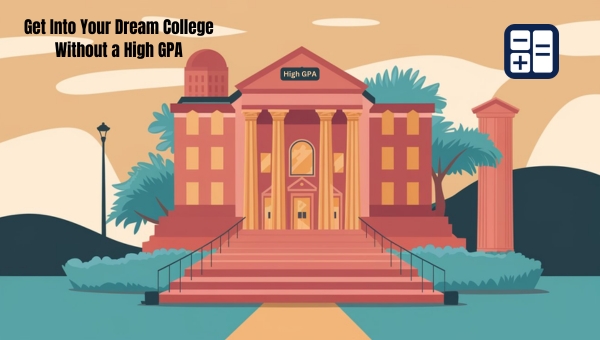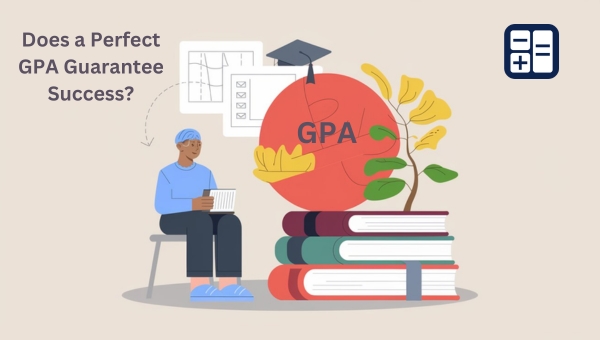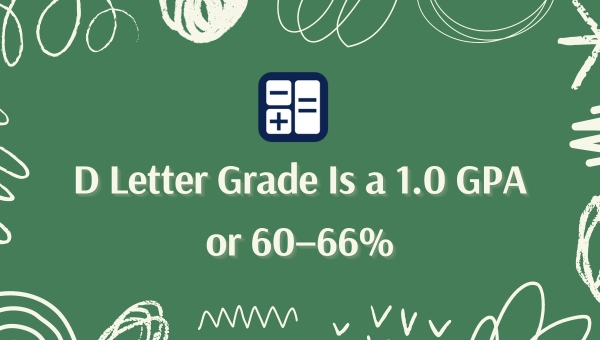1.5 GPA Is a D+ Letter Grade or 67–69%

When you see a GPA of 1.5, it’s essential to understand that it translates to a D+ letter grade or a 67-69% range. This level of performance indicates that significant improvement is needed to meet academic standards.
If you’re a high school student, this GPA can affect your future options, including college admissions and scholarship opportunities. But don’t worry; there are effective strategies to help boost your GPA quickly. Curious about how to turn things around and achieve better academic results? Let’s explore some actionable tips to elevate your performance.
What is a 1.5 GPA?
A 1.5 GPA, often referred to as a grade point average, represents a student’s academic performance on a scale typically ranging from 0.0 to 4.0. This particular GPA is generally considered to be below average, falling in the range of a D+ letter grade.
It’s a clear indicator that a student is struggling with their coursework and may need additional support or strategies to improve.
When you see a 1.5 GPA, it means that the average of all your grades is just slightly above a D, which is often around 67-69%. This percentage signifies that while you’ve passed most of your classes, you’re not mastering the material to a satisfactory level.
Teachers, parents, and students themselves should view this as a signal that something needs to change to boost academic performance.
To improve a 1.5 GPA, you should focus on identifying the areas where you’re struggling the most. This might involve seeking help from tutors, attending extra study sessions, or even discussing your challenges with your teachers.
Don’t get discouraged; instead, use this GPA as a motivation to work harder and develop better study habits.
What does a 1.5 GPA mean for high school students?
A 1.5 GPA can impact your college application process, making it crucial to understand your options. Safety schools may be more realistic, while target schools could still be attainable with strong extracurriculars or test scores. Dream schools might be a stretch, but focusing on improvement and showcasing your strengths can help.
Safety Schools
Navigating high school with a 1.5 GPA can feel daunting, but it doesn’t mean that college is out of reach. Safety schools are colleges where your chances of admission are higher since they typically have lower GPA requirements.
Here’s what you need to consider:
- Research Community Colleges: These institutions often have open admission policies, meaning they accept students regardless of their GPA. Community colleges can serve as a stepping stone, allowing you to improve your academic standing before transferring to a four-year university.
- Explore Less Competitive Universities: Some universities have more lenient admissions criteria. Research these schools and see which ones match your interests and career goals. Many smaller or regional schools offer excellent programs and support systems for students who need a bit more academic assistance.
- Focus on Holistic Admissions: Some colleges look beyond GPA and consider other factors such as extracurricular activities, personal essays, and letters of recommendation. Highlight your strengths, whether they’re in leadership, volunteer work, or unique personal experiences.
Target Schools
Having a 1.5 GPA in high school might make you feel like your options are limited, but don’t lose hope. You can still find target schools that suit your academic profile and offer opportunities for growth.
Here are a few steps to help you identify and apply to these schools effectively:
- Research Schools: Look for community colleges and smaller universities that have more flexible admission requirements. These institutions often focus on providing support for students who may not have high GPAs but show potential and dedication.
- Highlight Strengths: Emphasize other aspects of your application, such as extracurricular activities, volunteer work, and personal achievements. Schools appreciate well-rounded students who contribute to their campus community in various ways.
- Improve GPA: Show a commitment to improving your academic performance. Taking summer classes, enrolling in tutoring, or focusing on subjects where you can excel can demonstrate your willingness to work hard and succeed.
Dream Schools
While targeting schools that match your current academic standing is important, it’s equally crucial to understand what a 1.5 GPA signifies for your high school journey and your dreams.
A 1.5 GPA translates to a D+ average, meaning you’re likely struggling with your coursework. This can limit your options when it comes to dream schools, but it doesn’t mean all hope is lost.
Here are three steps to help you navigate this challenge:
- Identify Areas for Improvement: Pinpoint specific subjects or skills where you need help. Seek tutoring, join study groups, or ask teachers for extra assistance. Improving in these areas can boost your GPA over time.
- Set Realistic Goals: While you may have dream schools in mind, consider setting short-term academic goals to gradually improve your GPA. Aiming for a 2.0 or 2.5 GPA by the end of the next semester can make a significant difference.
- Explore Alternative Pathways: Community colleges and vocational schools can be excellent stepping stones. Excelling in these environments can provide opportunities to transfer to a four-year college later.
Proven Tips to Get a 1.5 GPA
If you’re aiming for a 1.5 GPA, start by prioritizing class attendance and adopting effective study techniques.
Make sure to utilize office hours for extra help, manage your time wisely, and join study groups to reinforce learning. These strategies can help you achieve your GPA goals with a structured approach.
Prioritize Class Attendance
One of the key strategies to securing a 1.5 GPA is prioritizing class attendance. When you consistently attend classes, you’re more likely to catch important information, understand course material, and stay on top of assignments. Being present means you can ask questions, clarify doubts, and engage with the content in real time.
Skipping classes, on the other hand, can lead to gaps in your knowledge, making it difficult to grasp concepts and keep up with coursework. Professors often provide insights and tips during lectures that aren’t available in textbooks or online notes. By attending class regularly, you’re more likely to hear these valuable nuggets of information.
Additionally, some courses include participation points as part of the grading criteria. Regular attendance can help you accumulate these points effortlessly, giving your GPA a subtle but crucial boost.
Even if you don’t fully understand the material, showing up demonstrates a commitment to learning, which can sometimes reflect positively on your overall evaluation.
Effective Study Techniques
Mastering effective study techniques can significantly impact your GPA. First, create a study schedule. Allocate specific times for each subject and stick to it. Consistency helps reinforce learning and reduces last-minute cramming.
Next, break down your study material into manageable chunks. Instead of trying to tackle everything at once, focus on one topic at a time. This makes it easier to absorb and retain information.
Taking regular breaks is crucial. Studying for long periods without a break can lead to burnout and decreased productivity. After 25-30 minutes of studying, take a 5-minute break to recharge.
Utilize active learning techniques. Engage with the material by summarizing notes, teaching concepts to a friend, or creating flashcards. These methods enhance understanding and memory retention.
Don’t underestimate the power of a good night’s sleep. Adequate rest is vital for cognitive function and helps consolidate what you’ve studied.
Finally, minimize distractions. Find a quiet study space, turn off your phone, and focus solely on your work. This will improve concentration and efficiency.
Implementing these study techniques can help you achieve a 1.5 GPA, making your academic journey more manageable and productive.
Utilize Office Hours
Attending office hours can be a game-changer for achieving a 1.5 GPA. These sessions offer direct access to your professors, allowing you to clarify difficult concepts and get personalized feedback on your work.
Don’t hesitate to bring specific questions or areas where you’re struggling. This shows your commitment and helps your professor understand your needs better.
Prepare for office hours by reviewing your notes and identifying problem areas beforehand. Having a clear agenda will make the meeting more productive.
Additionally, ask for study tips or resources that could aid you in understanding the material better. Professors often have insights and supplementary materials that aren’t covered in class.
Engaging during office hours also helps build a rapport with your professors. They’re more likely to provide additional support if they see you’re making an effort.
If you miss a lecture or need clarification on an assignment, office hours are the perfect time to catch up.
Manage Time Wisely
Effective time management is crucial when aiming for a 1.5 GPA. You need to balance your study schedule with other commitments.
Start by creating a weekly plan that allocates specific times for studying each subject. Prioritize tasks based on due dates and difficulty levels. This way, you won’t find yourself cramming the night before an exam.
Use a calendar or planner to keep track of important dates and deadlines. Set reminders on your phone for additional prompts.
Break your study sessions into manageable chunks, such as 25-minute intervals with short breaks in between. This technique, known as the Pomodoro Technique, helps maintain focus and reduces burnout.
Avoid procrastination by tackling the hardest tasks first. Once you get those out of the way, the rest will feel less daunting. Limit distractions during study time. Turn off notifications on your phone and find a quiet, dedicated study space.
Lastly, make sure to include some downtime in your schedule. Balance is key; overworking yourself can lead to stress and decreased productivity.
Join Study Groups
While managing your time wisely sets a solid foundation, joining a study group can significantly enhance your efforts to achieve a 1.5 GPA.
Study groups provide a structured environment where you can share resources, clarify confusing topics, and stay motivated. They break the monotony of studying alone and allow you to benefit from the collective knowledge and experiences of your peers.
In a study group, you’ll find that different perspectives can make difficult concepts easier to understand. When you explain a topic to someone else, you reinforce your own understanding. This reciprocal learning can be incredibly beneficial.
Additionally, study groups can help you stay accountable. Knowing that others are relying on you to show up and participate can be a powerful motivator to keep you disciplined.
To make the most of a study group, choose members who are dedicated and have similar academic goals. Set clear objectives for each session and stick to a schedule.
Don’t be afraid to ask questions and contribute your own insights. By collaborating effectively, you’ll find that your grasp of the material improves, and you’re more likely to achieve that 1.5 GPA goal.
How to Raise Your GPA Fast?
One effective way to give your GPA a quick boost is to focus on improving your performance in courses where you’re currently struggling. Start by identifying these classes and dedicating extra time to study for them. Use resources such as tutoring centers, office hours, and online tutorials to grasp difficult concepts.
Don’t hesitate to ask your instructors for additional help or clarification on topics you find challenging.
Another strategy is to prioritize your assignments and exams based on their impact on your overall grade. Put more effort into high-point assignments and exams that can significantly influence your final grade.
Additionally, consider retaking courses in which you scored poorly. Many schools allow you to replace a lower grade with a higher one if you retake the class and do better.
Time management is crucial. Create a study schedule that allocates specific times for each subject and stick to it. Break down your study sessions into manageable chunks and take regular breaks to avoid burnout. Staying organized with your notes and assignments will also help you stay on top of your coursework.
Lastly, stay positive and motivated. Surround yourself with supportive friends and family who can encourage you through this process. Improving your GPA is challenging but achievable with the right strategies and determination.
Conclusion
Improving a 1.5 GPA is challenging, but it’s achievable with dedication and smart strategies. Remember, a D+ reflects a need for improvement, but it’s not the end. Focus on understanding your weaknesses and seeking help when needed.
Implement proven study habits, manage your time effectively, and stay motivated. By doing so, you can raise your GPA and open up more educational opportunities for yourself. Keep pushing forward—your future depends on it!




